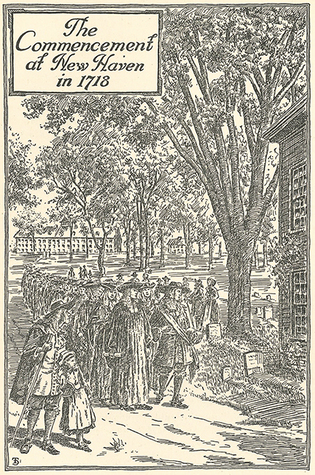 loading
loading
Old YaleThe first YaliesThe Class of 1718 were the inaugural graduates of the newly named Yale College.  Manuscripts & Archives/Engraving by Theodore Diedricksen Jr.An engraving from Edwin Oviatt’s 1916 book The Beginnings of Yale shows the 1718 commencement procession from the new Yale College building (in background) to the New Haven Meeting House on the Green. View full imageSeptember 10, 1718, was a day of firsts. The Collegiate School held its first public commencement in New Haven and the first under its new name: Yale College. So that year’s graduates were, in effect, the first Yale alumni. Moving the school from Saybrook to New Haven had been decided in 1716. Yet as late as April 1718, two powerful trustees were still teaching students in Wethersfield, having not given up on their proposal to move the college to the Hartford area. In a desperate play for time, they even asked Harvard to grant degrees to the seniors, hoping to disrupt the New Haven ceremony. (Harvard chose to stay out of it.) Eight men accepted their bachelor’s degrees at the New Haven commencement. Five more received graduation certificates in Wethersfield, but they were later awarded official diplomas. The biographies of these 13 offer an illuminating view of evolving New England history. They were born from 1691 to 1700–1701, in the reign of William and Mary; three lived to experience the first years of American independence. Until 1767, graduates’ names were listed in order of their social rank, usually based on the father’s occupation and reputation. In 1718, James Pierpont Jr. and Samuel Pierpont led the list. Their father, James Pierpont Sr., was a founding trustee and the former minister of the New Haven Meeting House, where commencement was held annually until 1895. After graduating, James Pierpont Jr. served terms as rector of the Hopkins Grammar School and as a Yale College tutor while preparing for the ministry. In 1724, he moved to Boston, where he opened an apothecary business. Pierpont’s second son, Samuel, was ordained to serve as minister in Lyme, Connecticut, in December 1722, when he was just 21. The following March, after visiting his fiancée in Middletown, he drowned while crossing the Connecticut River in a canoe. Fourth-ranking graduate Isaac Buckingham, also the son of a trustee, died at the age of 24. Three more classmates died young, including the lowest-ranked, Daniel Newell, who served as minister for the east side of Middletown (later Portland, Connecticut). While the majority of the 13 were ministers, some chose other careers. Joseph Backus was a lawyer, trader, and sheriff. Robert Treat returned to his family farm in Milford, Connecticut, where he became the author of the first Connecticut Almanac, in 1723. Timothy Collins, the first minister of Bantam (now Litchfield, Connecticut), was also the town physician. This dual role brought on “the people’s uneasiness with him,” according to town records, and eventually caused his dismissal in 1752. Collins continued to practice medicine in Litchfield, along with his wife, Elizabeth, who was noted for her skill in midwifery. He served as a surgeon in the French and Indian War. The Reverend Samuel Hopkins, of West Springfield, Massachusetts, is known today as the first advocate of maple sugar production in New England. His 1752 Memoirs Relating to the Housatunnuk Indians provided information on the making of maple sugar, which he described as “exceeding good, and considerably resembles Honey, . . . makes a very pleasant Drink, which is sufficiently Spirituous; and, I suppose, by being distill’d would make excellent Rum.” Hopkins wrote that local maples could, in place of the West Indies, “more than furnish all the British Colonies upon the Continent with Sugar.” The Class of 1718 was the largest in the school’s brief history to that date. By 1719, the students from the Wethersfield faction—including Jonathan Edwards, Class of 1720—had moved to New Haven. By summertime, Edwards was able to reassure his father in a letter: “I take very great content under my present tuition, as all the rest of the scholars seem to do under theirs.”
The comment period has expired.
|
|